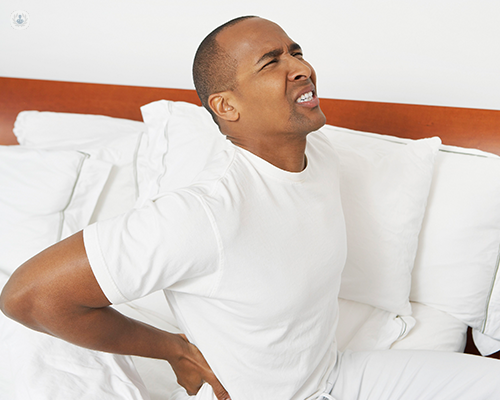Kidney stones: what are they and what are the symptoms?
Written by:Kidney stones will affect around 5 to 10 per cent of people in their lives. They can be harmless and you may not even notice them, but in some cases, they are incredibly uncomfortable or even painful. Mr Haider Syed, a leading consultant urological surgeon and kidney stone specialist, explains what these are, how they form and the symptoms to look out for.

What are kidney stones?
A kidney stone is a dense and compact material that forms inside the kidneys. These stones form from specific urine substances while the urine is still inside the kidney: calcium oxalate, cysteine and uric acid. Usually, stones form when one of these substances is too high, but they can form when these substances are at normal levels if daily urine production is low. Once a kidney stone has formed, it can become stuck in one of the small kidney pockets (called calyces) without causing any pain.
The majority of smaller kidney stones exit the body without a problem. If the stone is small (up to a few mm in size), it can exit the body painlessly and without discomfort by flowing with urine through the natural waste route – from the kidney to the ureter (the tube connecting a kidney with the bladder), the ureter to the bladder and then the bladder to the urethra (where urine exits the body).
However, bigger stones (over 5mm) can become stuck in the ureter, leading to blockage, or they can grow within the kidney to become staghorn stones, which can become very large and fill the kidney pockets.
Are kidney stones common?
Kidney stones affect 10 to 20 per cent of men and 5 per cent of women. The peak age for developing kidney stones is between 30 to 50 years’ old and it’s common for stones to reoccur after treatment.
Symptoms
Pain
The most common symptom is pain:
- Mild pain and/or discomfort: This could be caused by kidney stones that stay inside the kidney. It usually shows via intermittent low back pain.
- Severe pain: This could be caused by a blockage to the kidney, which results in renal colic (a spasmodic pain that radiates from the flank down to the groin).
Blood in urine (haematuria)
Kidney stones can result in blood in the urine. Blood in urine can be visible or might need a test to detect the blood i.e. a dipstick test on microscopic urine examination.
Recurring urinary tract infections (UTIs)
Large stones (staghorn stones) are more common in women and these can lead to recurring urinary tract infections with loin pain and burning urine.
In severe cases, this can result in pyelonephritis (a serious kidney infection) with symptoms of high temperature, shivering and generally feeling very unwell. If you think you may have this, seek urgent medical help immediately.
Asymptomatic
In many cases, there are no symptoms because the kidney stones aren’t causing a blockage. Asymptomatic stones might only be identified during routine examinations involving imaging scans.
For more information, be sure to read Mr Syed’s article on the diagnosis and treatment of kidney stones.
Don’t hesitate to visit Mr Syed’s profile to learn more and arrange your consultation – click here.


